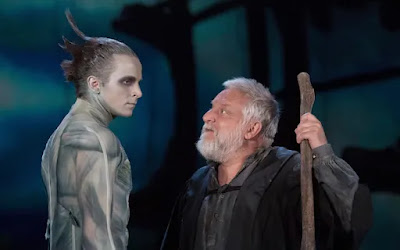Answer TWO of the following:
Q1: What do you make of the elaborate play (or "masque," a 17th century genre where allegorical figures perform with song and dance) in 4.1 with Iris, Ceres, and Juno? What is the "plot" of this play, and why is it staged for Ferdinand and Miranda?
Q2: One of Shakespeare’s most famous speeches, and certainly the most famous in this play, occurs in Act 4, scene 1, when Prospero begins, “Our revels now are ended…” Why might this be an important meta-moment in the play, one that extends beyond Prospero’s drama or even The Tempest itself? Is it “unscholarly” or anachronistic to read biography into it, or is it encoded in the text itself?
Q3: By Act 5, after speaking with Ariel, Prospero agrees that “The rarer action is/In virtue than in vengeance.” Has Shakespeare redeemed Prospero in a way that he couldn’t quite manage with Lear? Has he learned tolerance and forgiveness? Or was he intending to do this from the start? Do we see transformation in the play itself, or just more manipulation and calculation?
Q4: Does Act 5 seem like something of an anticlimax after the build up of Acts 2 and 3? Though all the plots are exposed, no one is really punished, not even Sebastian and Antonio, who were plotting to kill the king! Does this make the play a comedy, one that was “much ado about nothing”? Or a tragedy with a “tempest” to come in an unstaged Act 6?









